Tokyo Joe Blu-ray Movie
HomeTokyo Joe Blu-ray Movie 
Indicator SeriesPowerhouse Films | 1949 | 88 min | Not rated | No Release Date
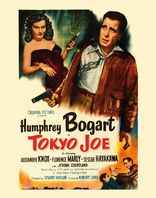
Price
Movie rating
6.3 | / 10 |
Blu-ray rating
| Users | 0.0 | |
| Reviewer | 2.0 | |
| Overall | 2.0 |
Overview
Tokyo Joe (1949)
An American returns to Tokyo try to pick up threads of his pre-WW2 life there, but finds himself squeezed between criminals and the authorities.
Starring: Hugh Beaumont, Humphrey Bogart, Alexander Knox, Florence Marly, Sessue HayakawaDirector: Stuart Heisler
| Drama | Uncertain |
| Film-Noir | Uncertain |
| Crime | Uncertain |
| Action | Uncertain |
| Thriller | Uncertain |
Specifications
Video
Video codec: MPEG-4 AVC
Video resolution: 1080p
Aspect ratio: 1.34:1
Original aspect ratio: 1.37:1
Audio
English: LPCM Mono (48kHz, 24-bit)
Subtitles
English SDH
Discs
Blu-ray Disc
Single disc (1 BD)
Playback
Region B (locked)
Review
Rating summary
| Movie | 2.0 | |
| Video | 3.5 | |
| Audio | 4.5 | |
| Extras | 3.0 | |
| Overall | 2.0 |
Tokyo Joe Blu-ray Movie Review
Reviewed by Dr. Svet Atanasov July 28, 2022Stuart Heisler's "Tokyo Joe" (1949) arrives on Blu-ray courtesy of Indicator/Powerhouse Films. The supplemental features on the release include exclusive new audio commentary by critic Nora Fiore; archival program with director Bertrand Tavernier; archival footage from post-war Japan; and more. In English, with optional English SDH subtitles for the main feature. Region-B "locked".
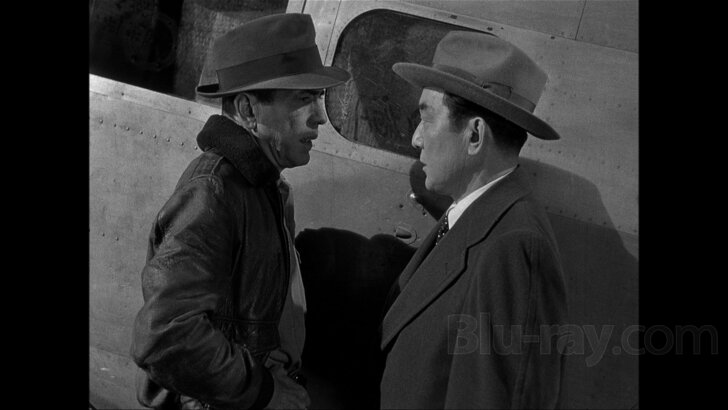
Humphrey Bogart disliked Tokyo Joe so much that he routinely dismissed it in public and some years after he made it even declared that it was ďworthlessĒ. Well, I would not describe Tokyo Joe as that kind of a terrible film, but it is certainly one of the iconic starís least impressive films. It has some good-looking bits from post-war Tokyo, but it juggles a couple of different identities in such an amateurish fashion that it becomes impossible to take seriously.
Soon after the end of WWII American Joe Barrett (Bogart) lands in Japan to see what has happened to the nightclub he used to run, Tokyo Joe Cabaret. Even before he is allowed to officially enter the country, however, Barrett realizes that the U.S. Army will cause him a lot of headaches with its strict new rules and regulations. At Tokyo Airport, despite Barrettís protests, an annoying U.S. bureaucrat confirms his expectation by giving him a visa only for sixty days.
Shortly after, Barrett reconnects with his former Japanese partner, Ito (Teru Shimada), and discovers that his clubís greatest attraction, the stunningly beautiful singer Trina Penchikov (Florence Marly), who had become his wife, did not die during the war, as he had assumed, and is now married to prominent local businessman Mark Landis (Alexander Knox). Even before reaching Trina, Barrett then begins working on a plan to extend his visa and ultimately reunite with her.
But to get what he is after Barrett is forced to improvise in some pretty unusual ways, which is how he ends up in a partnership with the very shady but powerful Baron Kimura (Sessue Hayakawa) who has aspirations of operating a freight airline. When Barrett discovers what the freight airline will be used for he attempts to back out of the partnership, but Kimura warns him not to do it because he has information proving that during the war Trina was a traitor working for the Imperial government. Around the same time, Barrett finally meets his former wife and she reveals to him that he has a seven-year-old daughter whose name is Anya (Lora Lee Michael).
Directed by Stuart Heisler in 1949, Tokyo Joe was the second film to be funded through Santana, Bogartís recently launched production company. The original material for Tokyo Joe came from a novel by Steve Fisher, whose earlier work inspired the classic film noir I Wake Up Screaming a.k.a. The Hot Spot.
Unfortunately, Tokyo Joe isnít in the same league with I Wake Up Screaming. (It is a world apart from the great film noirs Bogart made as well). Indeed, the bulk of it rehashes the same old themes that are at the center of Casablanca but without the quality direction and performances, leaving only its period visuals to do the work that is needed to make its story engaging and attractive. Unsurprisingly, despite the good cast, the end product is a pretty poor film that is instantly forgettable.
The most surprising aspect of Tokyo Joe, however, isnít Heislerís mediocre direction, but Bogartís inability to make a difference. The failures before the camera range from odd to bizarre, too. For example, there is an extremely odd big sequence where Bogart temporarily becomes a jiu-jitzu master and flips multiple times his Japanese partner. (Of course, an excellent vision isnít required to very clearly see that a much more athletic stunt actor does all the right moves). Bogartís numerous encounters with his ex-wife look quite bizarre as well because his presence is quite simply incompatible with the melodrama that is supposed to flourish in them.
Marly is extremely disappointing as well. Her character is the exact opposite type of woman that someone like Bogart would want to reunite with and risk his life for. Even when the two find the time to be alone, she looks unreachable and perplexingly cold.
Tokyo Joe Blu-ray Movie, Video Quality 
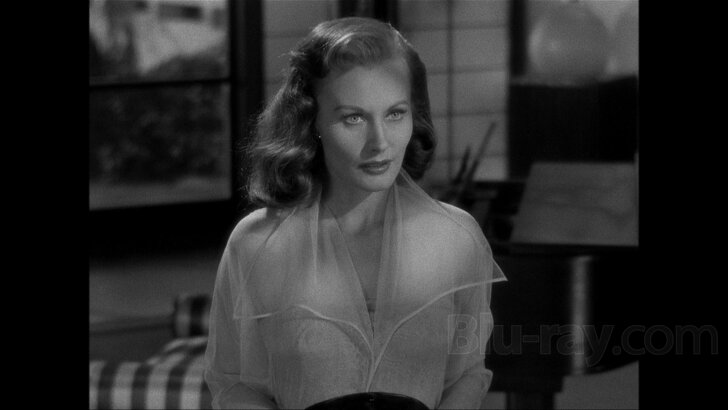
Presented in an aspect ratio of 1.34:1, encoded with MPEG-4 AVC and granted a 1080p transfer, Tokyo Joe arrives on Blu-ray courtesy of Indicator/Powerhouse Films.
The release is sourced from an older master that was supplied by Sony Pictures. The film looks a bit harsh. This isn't the type of distracting harshness you would encounter on some older masters that have emerged from Universal's vaults, but it makes some areas of the film look somewhat unnatural. Still delineation, clarity, and depth remain quite good. In some darker areas, shadow detail could be better, but there is still plenty to see. The grayscale is fine, but a new 4K master without the above-mentioned harshness will allow some of the black/darker nuances to be expanded. Fluidity can be improved. In fact, most camera zooms produce extremely light smearing which is a byproduct of the light sharpening that was applied to the master. Image stability is good, but some minor enchantments can be introduced. Various tiny white specks as well as a few scratches and blemishes can be seen. (Note: This is a Region-B "locked" Blu-ray release. Therefore, you must have a native Region-B or Region-Free player in order to access its content).
Tokyo Joe Blu-ray Movie, Audio Quality 
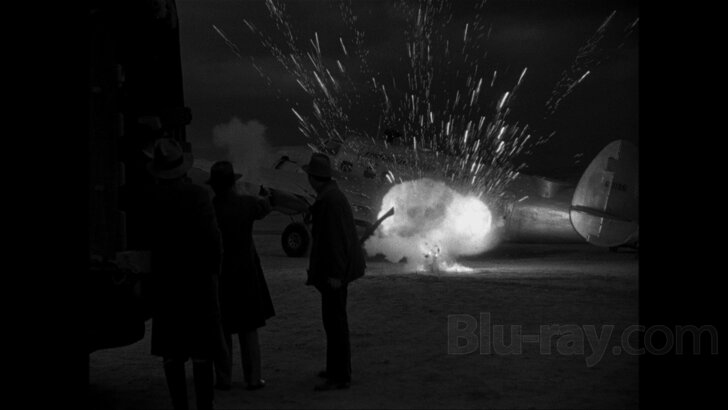
There is only one standard audio track on this Blu-ray release: English LPCM 1.0. Optional English SDH subtitles are provided for the main feature.
The audio is clear and easy to follow. However, if you turn up the volume a bit, you will easily detect the presence of a light background hiss. It is not distracting, but it is there and in some areas it even appears to have some sort of an effect on the upper register. So, if in the future the folks at Sony Pictures revisit Tokyo Joe, I am quite certain that these minor issues will be addressed.
Tokyo Joe Blu-ray Movie, Special Features and Extras 
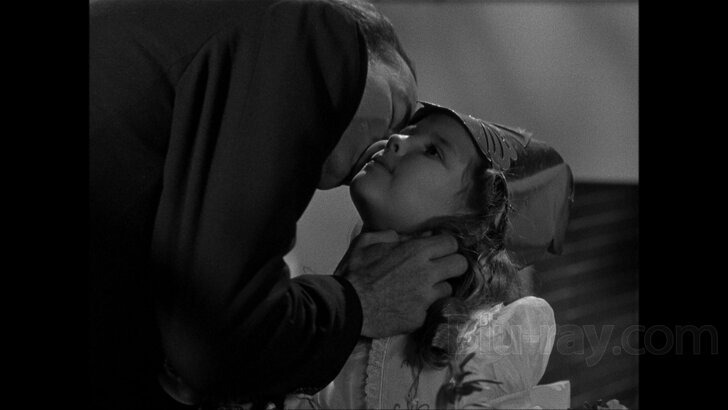
- Bertrand Tavernier on Tokyo Joe - in this archival program, director Bertrand Tavernier recalls the first viewing of Tokyo Joe and offers his thoughts on the film. In French, with English subtitles. (34 min).
- A Superstar Returns: Tom Vincent on Sessue Hayakawa - in this new program, critic Tom Vincent discusses Sessue Hayakawa's career and contribution to Tokyo Joe. In English, not subtitled. (15 min).
- Second Unit Photography - presented here is footage that was filmed in and around Tokyo in 1948 and used in Tokyo Joe in 1948. This footage is restored in 4K. Silent. (11 min).
- Image Gallery - a collection of original promotional materials for Tokyo Joe.
- The Negro Soldier (1944) - this short film was directed by Stuart Heisler in 1944. In English, with optional English SDH subtitles. (41 min).
- Jim Pines on The Negro Soldier - this archival audio piece was recorded by author and lecturer Jim Pines at BFI Southbank on November 20, 2010. In English, not subtitled.
- Commentary - this exclusive new audio commentary was recorded by critic Nora Fiore.
- Book - limited edition exclusive 120-page book with a new essay by Imogen Sara Smith, extensive archival articles and interviews, new writing on the various short films, and film credits.
Tokyo Joe Blu-ray Movie, Overall Score and Recommendation 
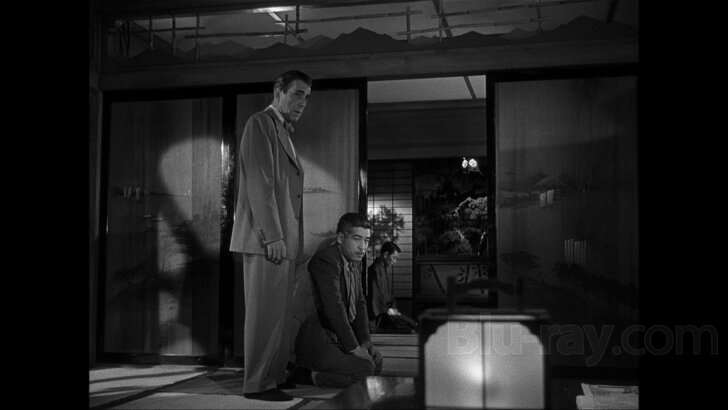
Tokyo Joe has a very bad reputation for a very good reason. Simply put, it is not a well-made film. Indeed, it juggles different identities in such an amateurish fashion that it very quickly becomes impossible to take it seriously. The footage from post-war Japan is mildly attractive, but it is not enough to declare that Tokyo Joe is effective as a time capsule either. This release is included in Indicator/Powerhouse Films' Columbia Noir #5: Humphrey Bogart six-disc box set.
Similar titles
Similar titles you might also like
(Still not reliable for this title)

Knock on Any Door
Indicator Series | Standard Edition
1949

Dead Reckoning
Indicator Series | Standard Edition
1947

Between Midnight and Dawn
Indicator Series
1950

House of Bamboo
Masters of Cinema | Limited Edition
1955

Convicted
Indicator Series
1950

Sirocco
Indicator Series | Standard Edition
1951

Affair in Trinidad
Indicator Series | Standard Edition
1952

The Family Secret
Indicator Series | Standard Edition
1951

The Harder They Fall
Indicator Series | Standard Edition
1956

Walk a Crooked Mile
Indicator Series | Standard Edition
1948

A Bullet Is Waiting
Indicator Series | Standard Edition
1954

Pushover
Indicator Series | Standard Edition
1954

The Brothers Rico
Indicator Series | Standard Edition
1957

Johnny O'Clock
Indicator Series
1947

The Undercover Man
Indicator Series | Standard Edition
1949

711 Ocean Drive
Indicator Series | Standard Edition
1950

The Garment Jungle
Standard Edition
1957

The Mob
Indicator Series
1951

Drive a Crooked Road
Indicator Series | Standard Edition
1954

Framed
Indicator Series | Standard Edition
1947
